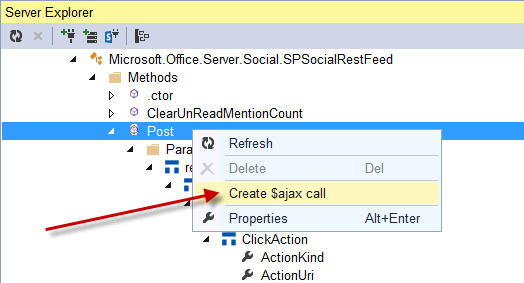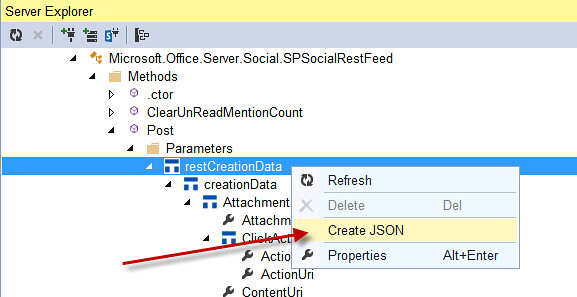One of the biggest road blocks for developers trying to learn the SharePoint 2013 REST API is the elusive complex type. Complex types are types that are used by the REST API to receive data as arguments from the client and to send data back to the client as a response. As a SharePoint developer you know and “love” these types by there JSON signature of {‘_metadata’:{type: SP.Whatever},…}. Having to figure these type names and what properties are available is a constant struggle. The complex type are not the same as entity types returned from libraries, lists and feeds but are typically used in API calls to do such things are create sub-sites or social posts. Complex types are named appropriately because they can be complex.
Here are some quick facts about complex types. There are 154 complex types defined in the REST API not all of which can be used by REST. There are 22 complex types which contain nested complex types. For example, the SP.Social.SocialRestPostCreationData complex type used to create a social post contains 5 nested complex types. There are 7 complex collection types which contain complex child item types. These collection complex types have a different JSON signature than complex types. Finally of the 154 complex types 68 are marked as either internal or private making them impossible to discover without the use of a reflection tool. The new $metadata schema information available in SP1 for the REST API is useful but does not give you any clues on how to construct the complex type in a POST. All of these facts make the SharePoint 2013 REST API difficult to learn and use.
SPRemoteAPIExplorer -- Visual Studio Gallery
SPRemoteAPIExplorer 2.0 Supports Discovery of REST Complex Types
In the previous version of SPRemoteAPIExplorer you could not see what properties were contained in the complex type if it was being used as a parameter to a method call. With version 2.0 you can now see complex types marked with a different icon in the explorer. You can expand it and see the properties contained within. The same information available for non-complex parameters is available such as whether it can be used in CSOM, JSOM or Managed Code.

As you can see the this complex type has many nested complex types. So how can you easily create this type in JSON and post it in the REST call?
Generate REST calls with SPRemoteAPIExplorer 2.0
Version 2.0 supports right clicking on the method and selecting the “Create $ajax call” menu item.

This will create a jQuery $.ajax code snippet and copy the code to the clipboard. The code will contain the JSON payload definition for the post setting the values to null. There is no need to lookup the type names and manage all the nesting. Also SPRemoteExplorer will also add proper syntax for multi- value properties and collection complex types. Below is the code that is generated. You can paste this into your javascript and start testing the call.
///method: Post resource: SP.Social.SocialRestFeed
$.ajax(
{
'url': 'restSource',
'method': 'POST',
'data': JSON.stringify({
'restCreationData': {
'__metadata': {
'type': 'SP.Social.SocialRestPostCreationData'
},
'ID': null,
'creationData': {
'__metadata': {
'type': 'SP.Social.SocialPostCreationData'
},
'Attachment': {
'__metadata': {
'type': 'SP.Social.SocialAttachment'
},
'AttachmentKind': null,
'ClickAction': {
'__metadata': {
'type': 'SP.Social.SocialAttachmentAction'
},
'ActionKind': null,
'ActionUri': null
},
'ContentUri': null,
'Description': null,
'Height': null,
'Length': null,
'Name': null,
'PreviewUri': null,
'Uri': null,
'Width': null
},
'ContentItems': { 'results': [''] },
'ContentText': null,
'DefinitionData': {
'__metadata': {
'type': 'SP.Social.SocialPostDefinitionData'
},
'Items': { 'results': [''] },
'Name': null
},
'SecurityUris': { 'results': [''] },
'Source': {
'__metadata': {
'type': 'SP.Social.SocialLink'
},
'Text': null,
'Uri': null
},
'UpdateStatusText': null
}
}
}),
'headers': {
'accept': 'application/json;odata=verbose',
'content-type': 'application/json;odata=verbose',
'X-RequestDigest': $('#__REQUESTDIGEST').val()
},
'success': function (data) {
var d = data;
},
'error': function (err) {
alert(JSON.stringify(err));
}
}
);
Sometimes you may only want to get the complex type JSON representation. This can be accomplished by right clicking on a complex type node and selecting the “Create JSON” menu item. This will copy the JSON to the clipboard.

No more searching for SharePoint 2013 REST code samples
SPRemoteAPIExplorer 2.0 should save you a lot of time searching for code samples on how to call many of the undocumented REST methods. The new code generation feature should make it easier to test the capabilities of the API. It will give you a chance to test this tool out also. I purposely allowed the REST code to be generated on methods that are marked as not supporting REST. This way you can test the validity of this assertion. You will find that even though the method is marked as supporting REST, if one of the parameter’s “OData Type” property is marked as Invalid, then the REST call will fail. I have developed this tool and SPFastDeploy to make SharePoint Online development quicker and easier. I hope you find some usefulness from this tool and please feel free to suggest improvements either here or on the Visual Studio Gallery Q/A section.
No comments:
Post a Comment